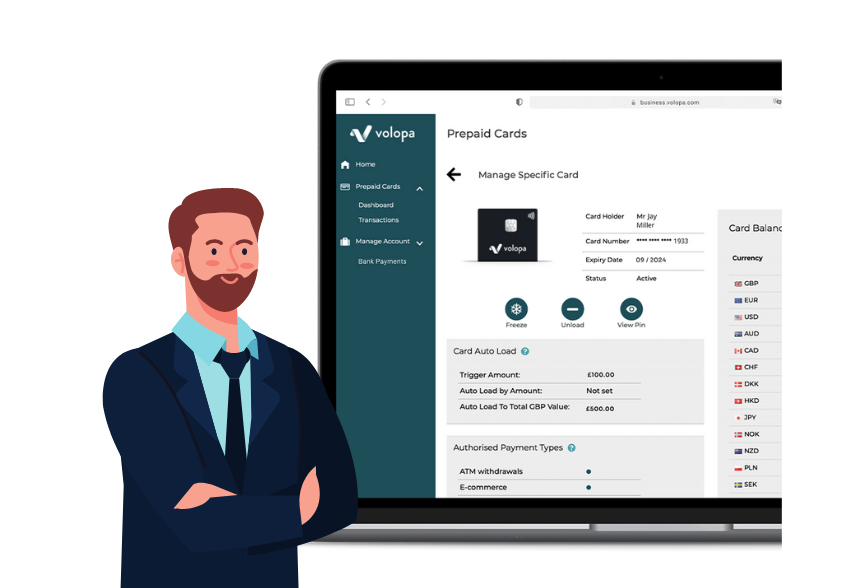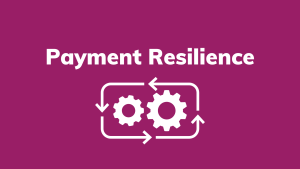Volopa product update
5 steps to simpler international payments

Are you still drowning in a sea of confusing wire transfers with your bank that take days to process? Simplify your global business payments with Volopa’s payments platform and save yourself from the gauntlet of hefty admin and foreign exchange charges.
We believe in empowering small businesses with the tools they need to take back their power from the big banks. Our intuitive platform covers all the bases for a faster, smarter, more cost-effective experience, from adding and managing your recipients to easy oversight of your payment details and history in real time. It allows you to pay local and international suppliers quickly and get access to transparent competitive market rates for every transaction.
Here are 5 easy and sure-fire steps to simpler international payments and achieving peak productivity for busy teams.
1. Get your facts right
First up, get all the necessary data from your recipients including their name & address, and their bank account details. With Volopa, once all the mandatory details are filled in and the recipient has been added, you can input their email address and any additional addresses you want to be notified of incoming payments.
2. Enter your payment details
We like to give businesses the flexibility to decide what is best for them. Therefore, when entering the payment amount, you have the option to enter the exact payment amount in the currency your recipient receives or enter the exact amount in the currency you wish to fund with. You also have the ability to change the funding currency should you wish to fund in a currency other than GBP.
Where available, we also give you the option to choose your preferred settlement method. You can send payments either as Priority or Regular. Priority payments cost slightly more, however provide the ability to recall and trace payments.
3. Review your payment breakdown & understand the cost
Exchange rates & payment fees are the largest variable costs to consider when making international payments. Although it is sometimes convenient to make international payments through your bank, banks tend to apply significant “spreads” to the exchange rate and tend to charge high payment fees. At Volopa on the other hand, we provide wholesale exchange rates which often can save you significantly. We are also very transparent with the exchange rate you’re getting (this is a real-time rate, which refreshes every 30 seconds) and the payment fees you’re charged.
In the payment details breakdown, you also get to see the expected delivery date of your payment, the exact amount your recipient will receive, how much we will convert, and the amount required to make the payment.
4. Hit send
Confirm your payment and that’s it! You can start making multiple payments to your suppliers. All details and preferences will be saved for future payments to this recipient, so the next time you pay, you can enjoy repeat payments in 2 simple clicks.
5. Alert your recipient
Once your payment has been sent, we will let your recipient know that it is on its way, giving you back the time you would have spent sending individual payment receipts. That’s one thing off your to-do list! (Check 
Upgrade your payments with Volopa
Our platform is packed with a number of helpful tools to save you from common payment errors that can disrupt your day. Avoid high bank charges and take advantage of same-day payments in a growing number of currencies. If you get stuck, you can speak to an account manager on the phone.
Focus on the work that counts; find out more about Volopa’s services online, including our multicurrency prepaid cards. Book a demo with our friendly sales team today.
Find out more about what Volopa can do for you

Securing the best exchange rates
Generally speaking, both banks and payments providers charge a margin, typically via a commission or a percentage-spread, for converting currencies from the funding currency (what you send them) to the payment currency (what the recipient receives). Banks are traditionally risk averse to currency movements due to the size of the portfolio of client assets they hold in multiple currencies. Any shock movement within the currency market can amount to significant losses, and in a bid to mitigate this risk, banks tend to apply higher margins.
International payments providers generally take a different approach, utilising live rates which they transact with immediately. Using this methodology, they don’t need to hold on to funds, the risk is less, and margins can therefore be much lower amounting to better exchange rates for their clients.
Payment Speed
Just as a bank cheque takes time to deposit into an account, so does sending money from one country to another. International FX payments can often take days to reach your recipient if sent via your bank. This is because banks often use manual currency conversion processes and tend to send funds via costly legacy banking networks. If you wish to transfer funds quickly, banks may not be your best option.
Specialist payments providers have established “points-of-difference” in the international payments market through innovative solutions to enable same-day international payments using more robust platforms and security systems. Specialist payment providers tend to route international payments via newer alternative payment rails that are quick, low-cost and easy to track, meaning recipients receive their payments in full and on time, while payment initiators can stay up to date with their payment statuses.
Conclusion
Whilst a bank may provide familiarity, specialised payments providers can offer better FX and payments expertise, superior technology and more cost-effective exchange rates. Through the tailoring of solutions and streamlining compliance requirements, services provided are largely more client-centric and focused. This often amounts to lower fees and charges as well as a superior customer experience for their clients.
Volopa product update
5 steps to simpler international payments

Are you still drowning in a sea of confusing wire transfers with your bank that take days to process? Simplify your global business payments with Volopa’s payments platform and save yourself from the gauntlet of hefty admin and foreign exchange charges.
We believe in empowering small businesses with the tools they need to take back their power from the big banks. Our intuitive platform covers all the bases for a faster, smarter, more cost-effective experience, from adding and managing your recipients to easy oversight of your payment details and history in real time. It allows you to pay local and international suppliers quickly and get access to transparent competitive market rates for every transaction.
Here are 5 easy and sure-fire steps to simpler international payments and achieving peak productivity for busy teams.
1. Get your facts right
First up, get all the necessary data from your recipients including their name & address, and their bank account details. With Volopa, once all the mandatory details are filled in and the recipient has been added, you can input their email address and any additional addresses you want to be notified of incoming payments.
2. Enter your payment details
We like to give businesses the flexibility to decide what is best for them. Therefore, when entering the payment amount, you have the option to enter the exact payment amount in the currency your recipient receives or enter the exact amount in the currency you wish to fund with. You also have the ability to change the funding currency should you wish to fund in a currency other than GBP.
Where available, we also give you the option to choose your preferred settlement method. You can send payments either as Priority or Regular. Priority payments cost slightly more, however provide the ability to recall and trace payments.
3. Review your payment breakdown & understand the cost
Exchange rates & payment fees are the largest variable costs to consider when making international payments. Although it is sometimes convenient to make international payments through your bank, banks tend to apply significant “spreads” to the exchange rate and tend to charge high payment fees. At Volopa on the other hand, we provide wholesale exchange rates which often can save you significantly. We are also very transparent with the exchange rate you’re getting (this is a real-time rate, which refreshes every 30 seconds) and the payment fees you’re charged.
In the payment details breakdown, you also get to see the expected delivery date of your payment, the exact amount your recipient will receive, how much we will convert, and the amount required to make the payment.
4. Hit send
Confirm your payment and that’s it! You can start making multiple payments to your suppliers. All details and preferences will be saved for future payments to this recipient, so the next time you pay, you can enjoy repeat payments in 2 simple clicks.
5. Alert your recipient
Once your payment has been sent, we will let your recipient know that it is on its way, giving you back the time you would have spent sending individual payment receipts. That’s one thing off your to-do list! (Check 
Upgrade your payments with Volopa
Our platform is packed with a number of helpful tools to save you from common payment errors that can disrupt your day. Avoid high bank charges and take advantage of same-day payments in a growing number of currencies. If you get stuck, you can speak to an account manager on the phone.
Focus on the work that counts; find out more about Volopa’s services online, including our multicurrency prepaid cards. Book a demo with our friendly sales team today.
Find out more about what Volopa can do for you

Securing the best exchange rates
Generally speaking, both banks and payments providers charge a margin, typically via a commission or a percentage-spread, for converting currencies from the funding currency (what you send them) to the payment currency (what the recipient receives). Banks are traditionally risk averse to currency movements due to the size of the portfolio of client assets they hold in multiple currencies. Any shock movement within the currency market can amount to significant losses, and in a bid to mitigate this risk, banks tend to apply higher margins.
International payments providers generally take a different approach, utilising live rates which they transact with immediately. Using this methodology, they don’t need to hold on to funds, the risk is less, and margins can therefore be much lower amounting to better exchange rates for their clients.
Payment Speed
Just as a bank cheque takes time to deposit into an account, so does sending money from one country to another. International FX payments can often take days to reach your recipient if sent via your bank. This is because banks often use manual currency conversion processes and tend to send funds via costly legacy banking networks. If you wish to transfer funds quickly, banks may not be your best option.
Specialist payments providers have established “points-of-difference” in the international payments market through innovative solutions to enable same-day international payments using more robust platforms and security systems. Specialist payment providers tend to route international payments via newer alternative payment rails that are quick, low-cost and easy to track, meaning recipients receive their payments in full and on time, while payment initiators can stay up to date with their payment statuses.
Conclusion
Whilst a bank may provide familiarity, specialised payments providers can offer better FX and payments expertise, superior technology and more cost-effective exchange rates. Through the tailoring of solutions and streamlining compliance requirements, services provided are largely more client-centric and focused. This often amounts to lower fees and charges as well as a superior customer experience for their clients.

Securing the best exchange rates
Generally speaking, both banks and payments providers charge a margin, typically via a commission or a percentage-spread, for converting currencies from the funding currency (what you send them) to the payment currency (what the recipient receives). Banks are traditionally risk averse to currency movements due to the size of the portfolio of client assets they hold in multiple currencies. Any shock movement within the currency market can amount to significant losses, and in a bid to mitigate this risk, banks tend to apply higher margins.
International payments providers generally take a different approach, utilising live rates which they transact with immediately. Using this methodology, they don’t need to hold on to funds, the risk is less, and margins can therefore be much lower amounting to better exchange rates for their clients.
Payment Speed
Just as a bank cheque takes time to deposit into an account, so does sending money from one country to another. International FX payments can often take days to reach your recipient if sent via your bank. This is because banks often use manual currency conversion processes and tend to send funds via costly legacy banking networks. If you wish to transfer funds quickly, banks may not be your best option.
Specialist payments providers have established “points-of-difference” in the international payments market through innovative solutions to enable same-day international payments using more robust platforms and security systems. Specialist payment providers tend to route international payments via newer alternative payment rails that are quick, low-cost and easy to track, meaning recipients receive their payments in full and on time, while payment initiators can stay up to date with their payment statuses.
Conclusion
Whilst a bank may provide familiarity, specialised payments providers can offer better FX and payments expertise, superior technology and more cost-effective exchange rates. Through the tailoring of solutions and streamlining compliance requirements, services provided are largely more client-centric and focused. This often amounts to lower fees and charges as well as a superior customer experience for their clients.


Securing the best exchange rates
Generally speaking, both banks and payments providers charge a margin, typically via a commission or a percentage-spread, for converting currencies from the funding currency (what you send them) to the payment currency (what the recipient receives). Banks are traditionally risk averse to currency movements due to the size of the portfolio of client assets they hold in multiple currencies. Any shock movement within the currency market can amount to significant losses, and in a bid to mitigate this risk, banks tend to apply higher margins.
International payments providers generally take a different approach, utilising live rates which they transact with immediately. Using this methodology, they don’t need to hold on to funds, the risk is less, and margins can therefore be much lower amounting to better exchange rates for their clients.
Payment Speed
Just as a bank cheque takes time to deposit into an account, so does sending money from one country to another. International FX payments can often take days to reach your recipient if sent via your bank. This is because banks often use manual currency conversion processes and tend to send funds via costly legacy banking networks. If you wish to transfer funds quickly, banks may not be your best option.
Specialist payments providers have established “points-of-difference” in the international payments market through innovative solutions to enable same-day international payments using more robust platforms and security systems. Specialist payment providers tend to route international payments via newer alternative payment rails that are quick, low-cost and easy to track, meaning recipients receive their payments in full and on time, while payment initiators can stay up to date with their payment statuses.
Conclusion
Whilst a bank may provide familiarity, specialised payments providers can offer better FX and payments expertise, superior technology and more cost-effective exchange rates. Through the tailoring of solutions and streamlining compliance requirements, services provided are largely more client-centric and focused. This often amounts to lower fees and charges as well as a superior customer experience for their clients.



